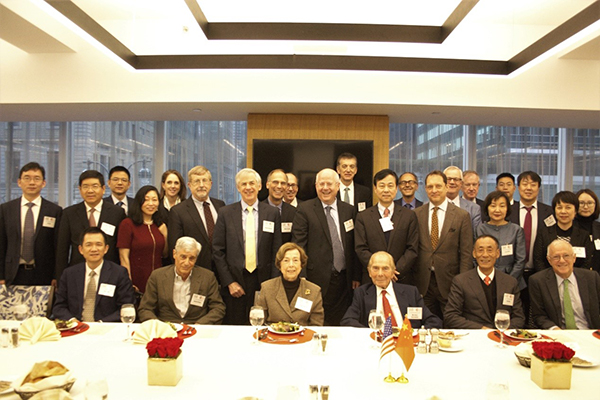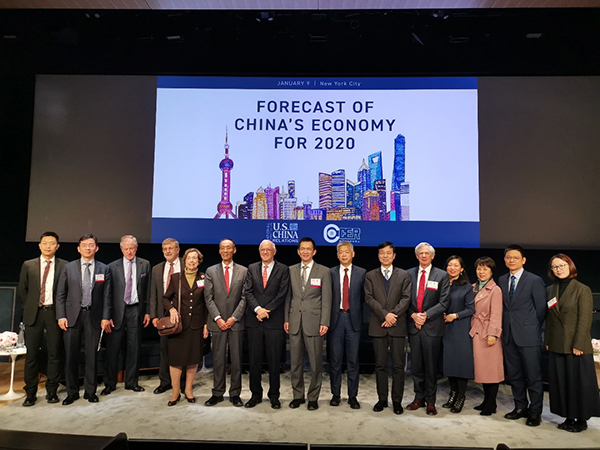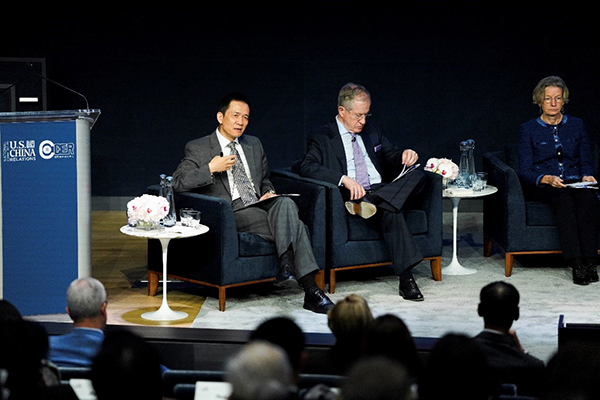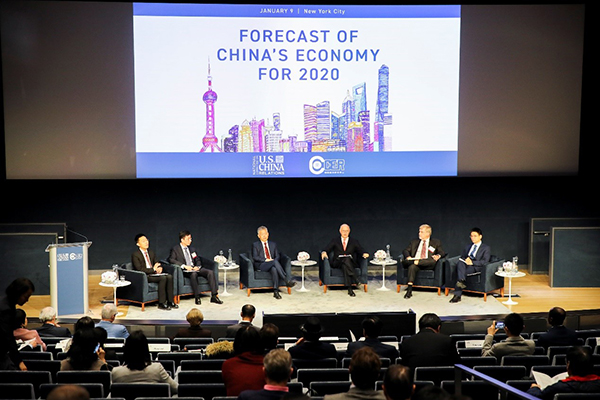
The 2020 China-US Track II Economic Dialogue and a forum themed on “Forecast of China’s Economy for 2020” was respectively held on January 8 and 9, 2020 in New York, the United States.

The 2020 China-US Track II Economic Dialogue
The China-US Track II Economic Dialogue was inaugurated in January 2010, and this closed-door event was held twice a year, alternatively in New York in January and in Beijing in summer. The 2020 China-US Track II Economic Dialogue was hosted in New York on January 8, also marking the 20th rounds of economic dialogue between the two sides. Chinese delegates attending the event included Dr. Xiao Qin, former Chairman of China Merchants Group and China Merchants Bank and also Head of the China’s delegation, Professor Yang Yao, Dean of the National School of Development (NSD) at Peking University (PKU), Professor Yiping Huang, Deputy Dean of the NSD, Professor Feng Lu, Associate Professor Min Wang, Research Fellow Xun Wang, Dr. Shanwen Gao, Chief Economist at Essence Securities, and Dr. Gao Xu, Chief Economist of Bank of China International Ltd. The speakers and panelists from the US were Miss. Carla A. Hill, former US Trade Representative, Mr. Maurice Greenberg, Chairman of C.V. Starr, Miss. Constance L. Hunter, Chief Economist at KPMG, Mr. Dino Kos, Chief Regulatory Officer at the CLS, and Professor Stephen Roach from Yale University.
The China-US Track II Economic Dialogue aims to promote policy exchanges via academic researches. Adopting a scientific attitude and rational thinking, representatives from the two sides conducted in-depth exploration on medium-to longer-term hot-spot issues concerning bilateral financial and trade relations and their impacts on the global economic landscape. The event helps the academic and business communities from China and the US take advantage of positive outcomes produced during the intergovernmental dialogues, and enhances mutual understanding as well as trust between the people of both countries. The two sides submit policy recommendations to their own governments, serving as decision-making reference.
The Forum on Forecast of China’s Economy for 2020
The Forum on Forecast of China’s Economy was also established in January 2010, and has held 11 session so far. Every year, some members of Chinese delegation sent to attend the China-US Track II Economic Dialogue held in New York will discuss with US economists on the hot-spot issues facing the two sides, in a bid to deepen their understanding and promote mutual trust.

This year, the Forum on Forecast of China’s Economy for 2020 was co-hosted by the National Committee on US-China Relations and NSD’s CCER on the morning of January 9 in the headquarter of the Citigroup in New York. Apart from the members of Chinese delegation attending this year’s China-US Track II Economic Dialogue, Mr. Steve Orlins, President of the National Committee on US-China Relations, Mr. Nicholas Lardy, Senior Fellow at the Peterson Institute for International Economics, Miss. Cathrine Mann, Global Chief Economist at Citi, Mr. Daniel Rosen, Founding Partner of Rhodium Group (a research consultancy and advisory company), and Professor Barry Naughton from the School of Global Policy and Strategy at the University of California, San Diego, were also present at the forum.
As a forum that has been held for consecutive eleven years, the Forum on Forecast of China’s Economy has expanded its global presence in the US. Many media outlets paid close attention to it and had wide coverage of the event. Meanwhile, many local political and business figures in New York also proactively participated in the forum.
The forum was divided into five sections, including welcome speech, keynote speech, two round-table discussions, and closing remark. Chris Bottiglieri, Managing Director of Citigroup; Steve Orlins and Yang Yao respectively delivered a welcome speech.

Afterwards, Dr. Xiao Qin delivered a keynote speech titled “New Balance Turning on China-US Trade War”. He pointed out that China and the US had reached a tentative agreement for the “Phase I” of a trade deal, possibly leading to a “partial decoupling” of the two economies in the future. This meant, against the backdrop of the current bilateral trade situation, the trade barriers established in some areas would not reduce the two powers to the Thucydides’ Trap. In the long run, China and the US intended to resolve the trade issues through different phases, which was conducive to the long-term trade development between both countries.
John Bussey, Assistant Managing Editor of The Wall Street Journal presided over the first round-table discussion during the forum. Guest speakers conducted in-depth discussion on the impacts of the China-US trade agreement on trade development between the two sides. The speakers engaged in the discussion included Professor Yang Yao, Dr. Nicholas Lardy, Ms. Cathrine Mann, Professor Feng Lu, Dr. Shanwen Gao and Mr. Daniel Rosen. According to Professor Feng Lu , the “Phase I” trade deal struck by China and the US played a positive role in alleviating the trade friction between the two economies. Professor Yang Yao said that if China and the US could treat political issues and economic issues separately, shelved political differences and focused on solving economic problems, these would definitely help the two sides seek a way out of the prolonged trade standoff. Dr. Shanwen Gao held that the core of the trade war lied in the different economic systems adopted by the two countries. If China could deepen its market-oriented reforms and improved the development environment for the non-public sector of the economy, China’s economy could be injected into new vitality and the China-US trade conflicts could be eased. Dr. Nicholas Lardy pointed out that China’s economic slowdown was related to declining external surpluses, deceleration in credit growth and credit mismatch. Therefore, the “Phase I” trade agreement produced limited impacts on China’s economic growth.
After a short coffee break, the second round-table discussion followed. The guest speakers were Mr. Steve Orlins, Professor Yiping Huang, Associate Professor Min Wang, Research Fellow Xun Wang, Dr. Gao Xu, and Professor Barry Naughton. They discussed and predicted the economic reform measures that Chinese authorities are likely to carry out in 2020 and the challenges they would face. According to Professor Yiping Huang, China’s financial reform and development had entered a new stage of development, which was conducive to the development of Chinese economy in 2020. He had a positive outlook for China’s economic growth in 2020. Dr. Gao Xu predicted that China’s GDP would continue to grow steadily in 2020. American economist Barry Naughton said that China’s reforms implemented since 2005 largely focused on the “financialization” of state-owned enterprises. But in recent years, more non-economic measures were expected, which was a reminder for the next-phase reform.

Finally, Professor Yang Yao and Mr. Steve Orlins respectively gave a closing speech, marking the conclusion of the Forum on Forecast of China’s Economy for 2020
Photos: Xinhua News Agency